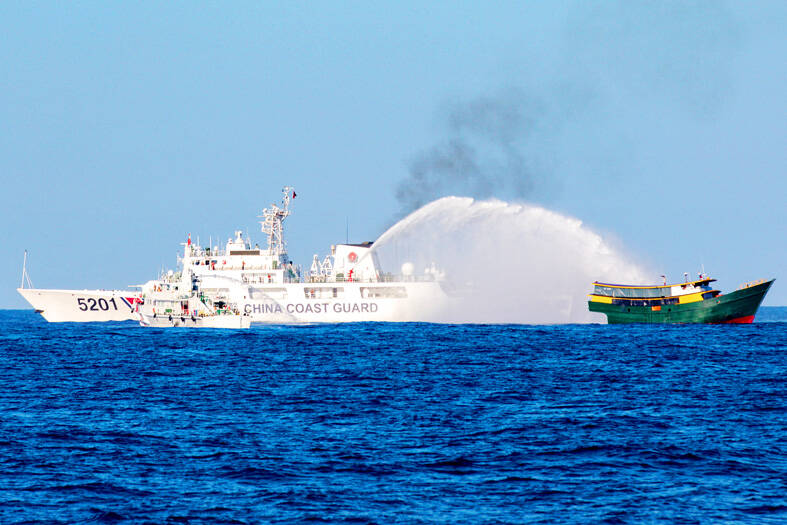Japan could cooperate with Taiwan and other Asian nations on maritime security to counter the threat posed by China, former Japan Coast Guard commandant Takahiro Okushima wrote in a recently published book.
China Coast Guard vessels regularly sail near the Diaoyutai Islands (釣魚台群島), known as the Senkakus in Japan, and Beijing has increased those patrols since the Japanese government purchased the islands from a private owner in 2012, Okushima wrote.
Over the past five years in particular, China has normalized its “harassment” of Japanese authorities near the islands, and conducted 159 patrols in 2018 and 352 last year, he wrote.

Photo: Reuters
The patrols are similar to those experienced by Taiwan, the Philippines and other nations in the region, who regularly encounter Chinese coast guard vessels near their waters, he wrote, adding that the issue could be soled without involving the military by establishing a joint “maritime law-enforcement agency” with the Japan Coast Guard at its center.
Okushima, who was in charge of maritime security near the Diaoyutais in 2012, and was promoted to commandant in 2000, retired in June 2022.
In his book, Okushima outlined four measures Beijing has adopted over the past few years to strengthen China’s coast guard: It increased its number of coast guard vessels, began producing larger vessels and arming them, put the coast guard under the authority of the Chinese Central Military Commission in 2021 and implemented the Coast Guard Law the same year.
“Ten years ago, the Japan Coast Guard had 51 patrol ships of more than 1,000 tonnes, and the China Coast Guard had 40 ships,” he wrote. “At the end of 2022 the Japan Coast Guard had 71 large patrol ships, while China had amassed 157 ships. Also, China’s ships use 76mm guns compared with Japan’s 40mm guns.”
Nevertheless, the Japan Coast Guard is well-trained and can respond to provocations without allowing them to escalate, he wrote, adding that it is trusted by the nation’s neighbors.
As China ramps up its harassment of Philippines vessels in contested waters there are concerns in Japan that it would start harassing Japanese vessels just as often, Okushima said.
The Japan Coast Guard would respond in such a scenario, and would handle the situation in a manner that would avoid an armed conflict, he said.
In its general budget for this year, Japan allocated ¥261.1 billion (US$1.8 billion) for maritime security, an increase of 7 percent from the previous year, and the highest amount ever budgeted for the purpose, Okushima said, adding that this included ¥21.3 billion for patrolling the Diaoyutais.
“Strengthening coast guards, which are non-military law enforcement agencies, is an effective tactic for Asian countries to confront a powerful China,” he said.

An essay competition jointly organized by a local writing society and a publisher affiliated with the Chinese Communist Party (CCP) might have contravened the Act Governing Relations Between the People of the Taiwan Area and the Mainland Area (臺灣地區與大陸地區人民關係條例), the Mainland Affairs Council (MAC) said on Thursday. “In this case, the partner organization is clearly an agency under the CCP’s Fujian Provincial Committee,” MAC Deputy Minister and spokesperson Liang Wen-chieh (梁文傑) said at a news briefing in Taipei. “It also involves bringing Taiwanese students to China with all-expenses-paid arrangements to attend award ceremonies and camps,” Liang said. Those two “characteristics” are typically sufficient

A magnitude 5.9 earthquake that struck about 33km off the coast of Hualien City was the "main shock" in a series of quakes in the area, with aftershocks expected over the next three days, the Central Weather Administration (CWA) said yesterday. Prior to the magnitude 5.9 quake shaking most of Taiwan at 6:53pm yesterday, six other earthquakes stronger than a magnitude of 4, starting with a magnitude 5.5 quake at 6:09pm, occurred in the area. CWA Seismological Center Director Wu Chien-fu (吳健富) confirmed that the quakes were all part of the same series and that the magnitude 5.5 temblor was

The brilliant blue waters, thick foliage and bucolic atmosphere on this seemingly idyllic archipelago deep in the Pacific Ocean belie the key role it now plays in a titanic geopolitical struggle. Palau is again on the front line as China, and the US and its allies prepare their forces in an intensifying contest for control over the Asia-Pacific region. The democratic nation of just 17,000 people hosts US-controlled airstrips and soon-to-be-completed radar installations that the US military describes as “critical” to monitoring vast swathes of water and airspace. It is also a key piece of the second island chain, a string of

The Central Weather Administration has issued a heat alert for southeastern Taiwan, warning of temperatures as high as 36°C today, while alerting some coastal areas of strong winds later in the day. Kaohsiung’s Neimen District (內門) and Pingtung County’s Neipu Township (內埔) are under an orange heat alert, which warns of temperatures as high as 36°C for three consecutive days, the CWA said, citing southwest winds. The heat would also extend to Tainan’s Nansi (楠西) and Yujing (玉井) districts, as well as Pingtung’s Gaoshu (高樹), Yanpu (鹽埔) and Majia (瑪家) townships, it said, forecasting highs of up to 36°C in those areas